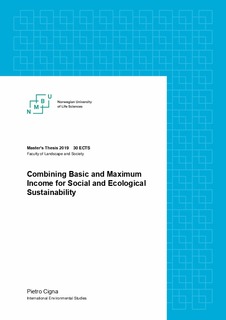Combining basic and maximum income for social and ecological sustainability
Master thesis
Permanent lenke
http://hdl.handle.net/11250/2608986Utgivelsesdato
2019Metadata
Vis full innførselSamlinger
Sammendrag
The current growth-addicted economic system is neither socially, nor ecologically sustainable. Inequalities are rising worldwide, while the conditions necessary to support seven to ten billion people on planet Earth are being eroded by excessive natural resources use, waste production and pollution. Meanwhile, countries of the Global North have appropriated most benefits generated by economic growth, and countries of the Global South have carried most of the costs. The post-growth field of studies explores how societies can thrive without a growing GDP and how to move towards a more sustainable economic system. To pursue this objective, a Universal Basic Income – a state-provided unconditional payment covering one’s basic needs – is proposed in combination with a maximum income – a cap on individual income. In this research, I explore the social and ecological sustainability of a basic/maximum income policy by examining the arguments for and against it, its effects on people’s working habits and the desirable ratio between UBI and maximum income. I also investigate barriers and opportunities on the way to implement it at the national or international level to uncover its political feasibility. Data were collected by reviewing the literature and by selecting India, and more specifically the state of Kerala, as case study, and by conducting semi-structured and structured interviews with 60 people. Even though empirical results showed a lack of support for a basic/maximum income policy in India and Kerala, the proposal should not be abandoned but accompanied by additional instruments. I argue that a basic/maximum income policy with a ratio of 1:10 would promote social and ecological sustainability, but only if first implemented in the Global North, democratically supported, coupled with a cultural shift and with the possibility by states to address short-term shocks.

